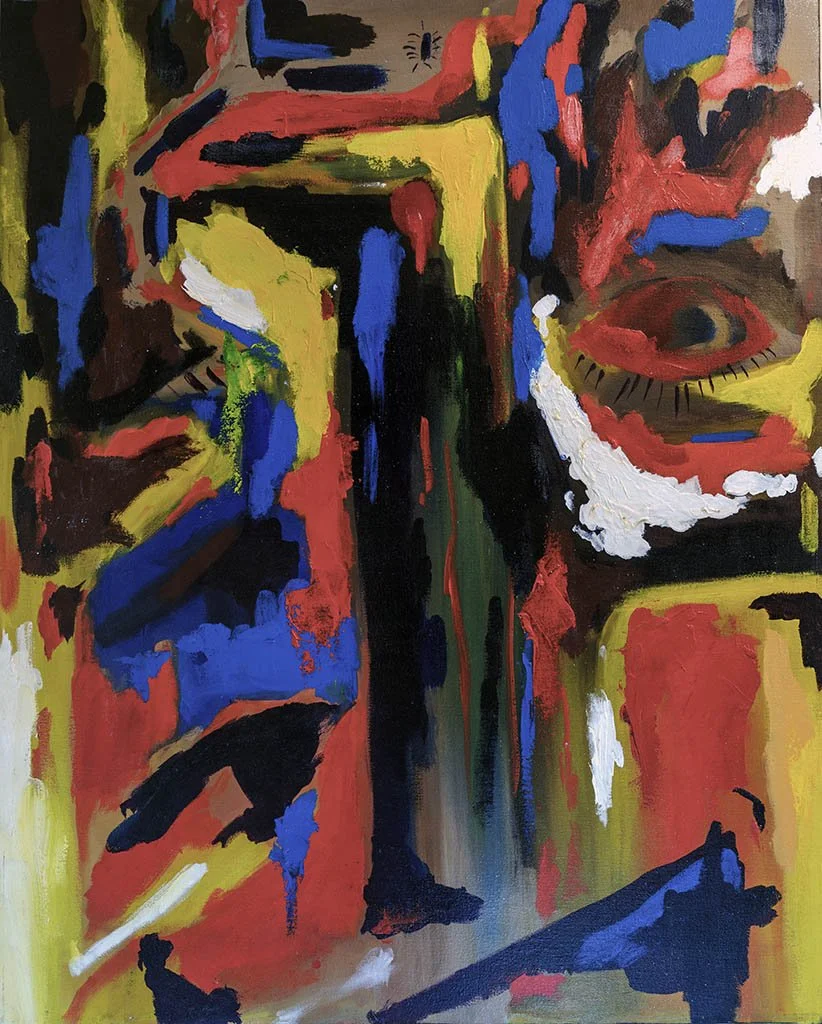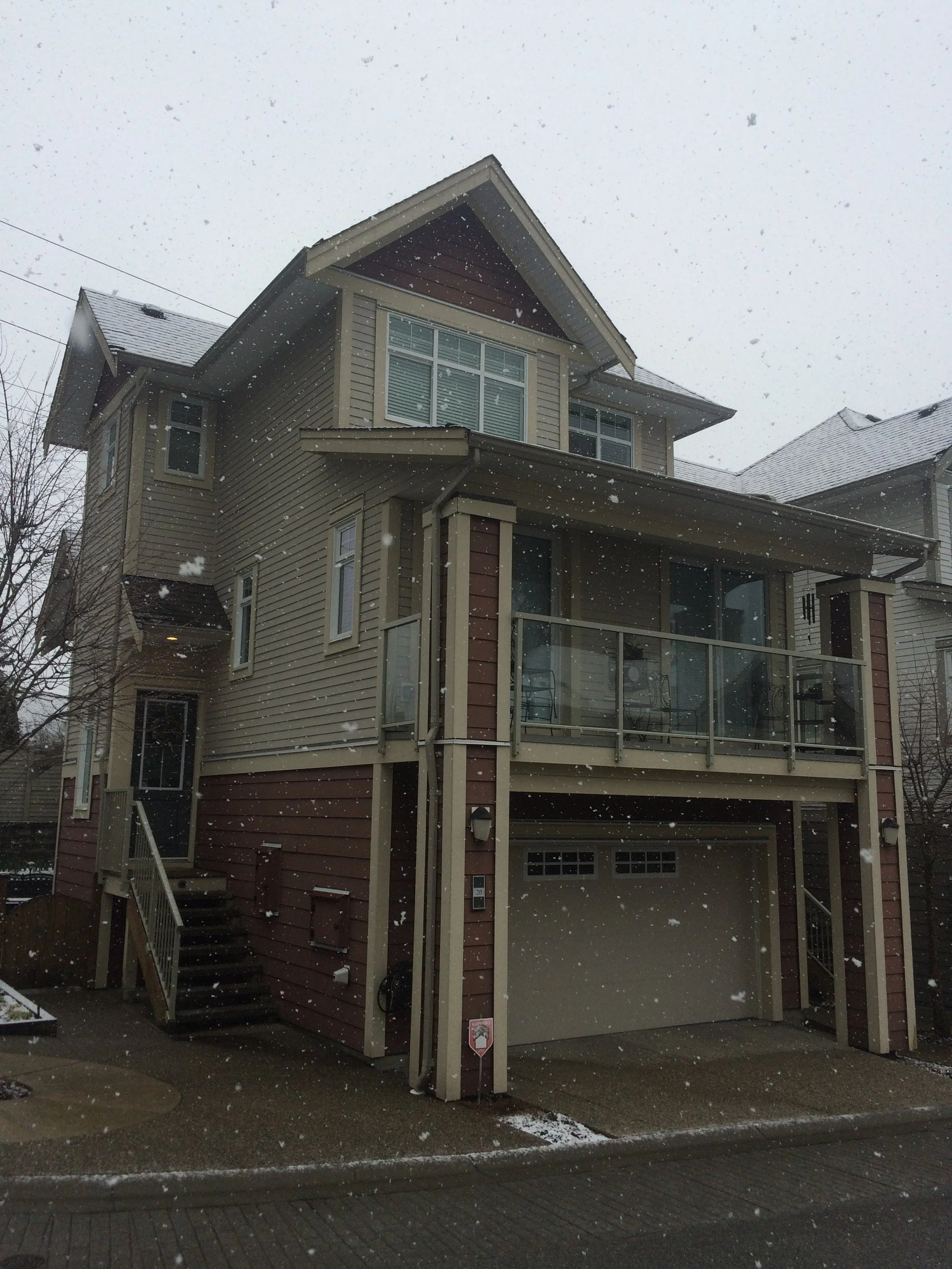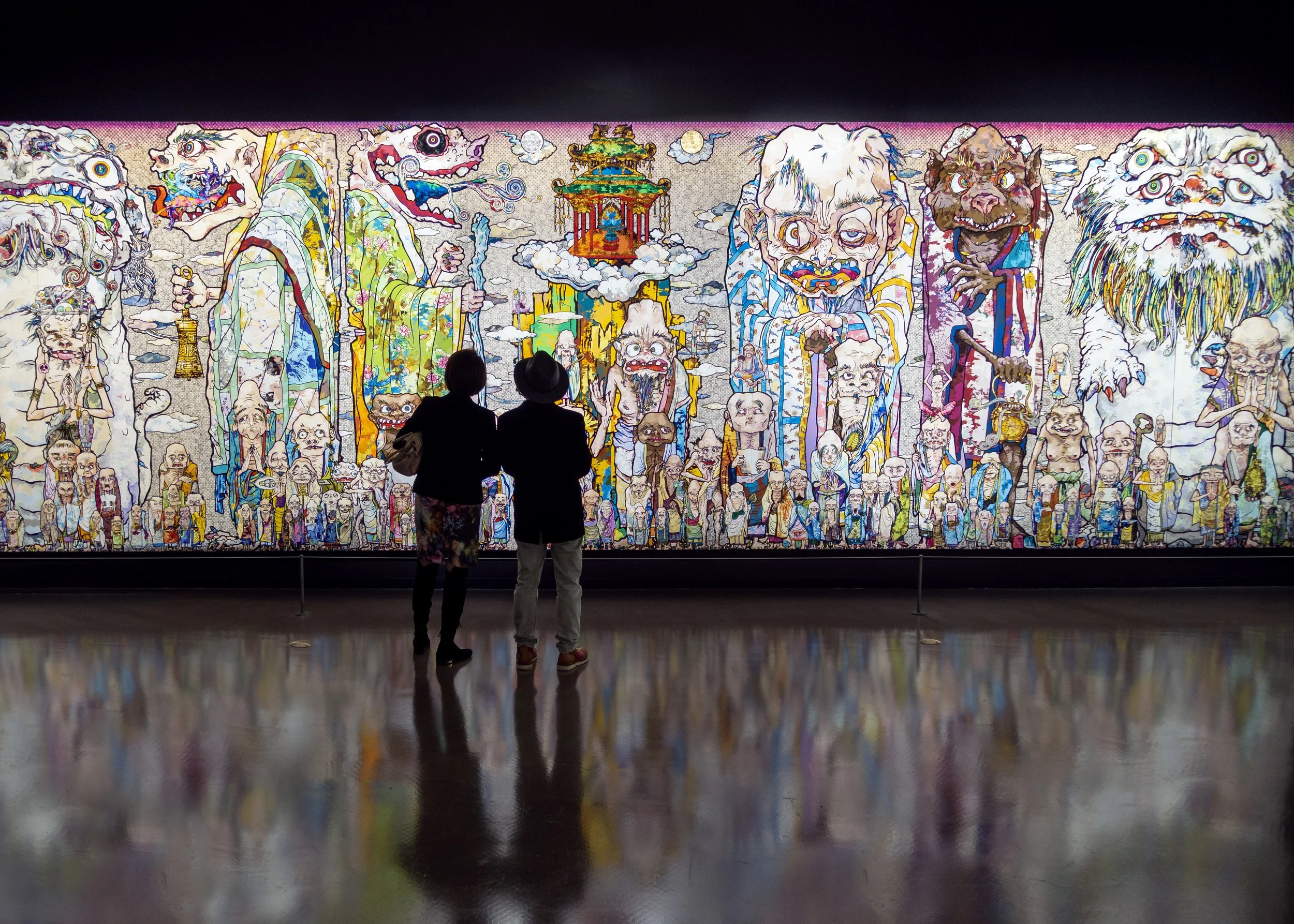2.3. Ways of Knowing and Your Stories
There’s only one time I remember my Dad crying. He was sitting at his large mahogany desk that sat in the den of the condominium he and my Mother owned in Vancouver, overlooking Coal Harbour with Stanley Park off in the distance. I don’t know what drew me into his space late that afternoon, but from where I stood to his right, peering over his shoulder at the letter he held in his hands, I could see tears welling up in his right eye. The soft, flowing, handwritten characters in black ink rested on the paper he held. Beneath the pages was an envelope with its side splayed open by my Dad’s letter opener, addressed to him, Hanju Lee. The language appeared painterly to me, achingly beautiful even though the story the letter told were locked from my understanding as they were composed in Hangul script, the Korean alphabet, which I did not know. As the only Korean in the small mountain town of Williams Lake, there was never a need for my Dad to speak his native tongue with either my Caucasian-Canadian Mum or myself. As an adult I’ve read that language acquisition is a multifaceted way of knowing. Alexander Gentry, in his 2024 article for Medium, Why Language Learning Matters: Not Just a Tool for Communication, explains how: “Language learning is a gateway to new ways of thinking, a bridge between cultures, and a powerful tool for personal and cognitive development.” I don’t remember having the courage to ask if everything was alright, and it took a moment before he noticed me standing there. But through his voice, quivering in quiet disbelief, eventually he found the words to share with me the heart of what the letter conveyed: his brother had died.
Born February 11, 1924, my Dad was brought up in the country of Korea while it was under Japanese occupation. Through my own drive and desire to learn about my late Father in 2023, I learned how it was a brutal occupation, one that seems to have borrowed heavily from the restrictions the Canadian government had imposed on its First Nations people as laid out in the Canadian Indian Act - 1867. Korea itself was officially renamed Chōsen, with cities also being given Japanese names. Korean cultural practices, history, and language were suppressed with the ultimate goal laying in the assimilation of Koreans into Japanese society. Korea’s agricultural and resource sectors were focussed on benefiting Japanese interests first and foremost. Labour was also exploited during this time and eventually used in support of Japan’s war efforts.
From what I have read, my Dad’s formal education during the occupation would have been fairly formal and even conservative in its approach: very much grounded in generalized and practical knowing. There was a strong emphasis on the fundamentals of reading, writing, and arithmetic. Korean language and culture was not a primary focus, as a focus on Japanese curriculum was put into place. This would have meant that any foundational knowing would have had to have been passed on through the home especially when it came to the passing down of Indigenous and Ancestral knowledge. It appears one track prepared students for jobs, and another for higher education. My Dad would become a medical doctor and surgeon, studying at the prestigious Yonsei University, so his path through primary and secondary education was clearly rooted in moving towards obtaining an in-depth and thorough type of higher education.
.
I felt how my Dad’s worldview was shaped by believing education should have a strong emphasis on generalized and practical knowing in my own interactions with him whenever he tried to help me with my studies. He had a very strong ability to calculate even complex mathematical equations in his head. I remember even when he was near the end of his life, he could still do rapid fire multiplication in his head at the dinner table. “What’s fifty-six times three hundred and twenty five?” I might ask.
“Eighteen thousand, two hundred.” He’d respond after only a matter of seconds passed by. But as a child, I struggled with even the most simplest equations of the multiplication system. Fractions were also a struggle, as well as geometry and division. I remember the long sighs that escaped from under his breath the nights I sat in front of him, struggling to solve the problems laid out for homework in my textbooks. “Tsk, tsk.” was another frequent phrase of his, followed by his asking rhetorically, “What do they teach today?” I always felt inadequate that I could never keep up with his mastery of math, science, and other subjects that saw him able to recall assorted facts as though he was on an episode of Jeopardy.
I struggled with other generalized and practical subjects. English language and grammar was a big obstacle for me. My folks hired tutors for me, to seemingly no avail. Even today, although I can write beautifully at times, I’ll struggle telling you the definitions of an adverb or a preposition, and don’t even try to get me to explain what a dangling participle is, even if you’re holding a gun to my head. You’ll have to pull the trigger. There was one particular instance in my youth where I felt disadvantaged because of my difficulties with learning grammar rules. I was in either grade 5 or 6, and the teacher had a project for those in the class who scored a certain grade on a grammar exam: they would get to write and illustrate their own children’s story. The prospect of writing a story excited me, but I didn’t get the minimum grade required to create one. I felt shattered. Looking back I still don’t understand why the teacher chose to approach it this way. Everyone should have had a chance to write something, to apply the grammar we were learning, to correct it as part of the editing process. To learn how to craft a simple story where a protagonist has a simple goal with an obstacle they have to overcome to achieve their goal. To then create simple drawings to go alongside their text in a book that would be 8-12 pages long. To share with each other and our teacher, to learn how to listen deeply, as we worked on our stories together. The funny thing is: I can’t remember what those of us who didn’t get to write a story had to do for the rest of that time during English. Three of the kids who did get to write a tale were my closest friends, and although I never admitted it to anyone, I was really envious of them. But even worse, I felt inadequate and ashamed. Like I wasn’t good enough to create, because I had trouble grasping the basic skills of elementary school grammar.
Ultimately, once you shuffle off the various labels applied to me in my youth (“Steven’s dyslexic…”, “Steven has attention deficit hyperactivity disorder…”), I feel my strongest way of knowing came through creative artistic expression and knowing, as well as through experiential learning. The complete opposite of my Dad. That summer, I started writing a children’s story of my own, ‘The Ant and the Bee.’ I don’t remember what it was about other than the fact that its premise and theme were modelled on the kinds one would find in Aesop’s Fables. And when I finished it, I proudly gifted it to my Mom, who has it in a plastic bin somewhere in a closet with other small mementos from my childhood. But it was an insular moment, void of opportunity for development during the act of creation through the interaction with others.
I remember when I studied piano as a child I discovered I was very good at making playing by ear, but my ability to learn and retain fundamental musical theory was difficult. But I loved to listen, watch, and play. Years after I had started practicing, I remember giving a recital at church and the pastor whose wife was my teacher, said that there was a beautiful emotional quality to my playing that wasn’t there with the other kids. In reflecting back on what he had said, his description of my playing made it feel as if what I had performed felt spiritual. And I had gotten there through play. In the 1984 movie AMADEUS, there’s a scene where Mozart hears a composition being played by the Austrian Emperor, as written by his court composer, Salieri. The Emperor has no ear, and a very weak ability to read the notes on the page. He offers the sheet music as a gift to Mozart who declines it, saying the piece was already committed to his mind. Everyone seems taken aback at this, and the Emperor demands that he prove it. And Mozart does, discussing and playing the piece, and then riffing on it like an early 20th Century Jazz musician. I’m certainly not comparing myself in any way to the genius of Mozart who at that time was a complete master of his craft - but I can resonate with his ability to listen and then play as that is very much my primary strength when it comes to learning.
Today, as I work on developing my own artistic knowledge, skills, and abilities through my emerging practice, I find my curiosity is stronger than ever. My curiosity feeds an interdisciplinary process towards exploring ideas that interest me. For example, lately I have been exploring the theme of loneliness as represented in a variety of art, films, and music. I’ve enjoyed doing a lot of secondary research on this topic over the last year which has included listening to a wide range of audiobooks on the subject, as well as to several podcasts. I’ve delved into memoirs, interviews, and kept an open mind towards being able to recognize anything related to the topic that may arise from time to time. I’ve done some primary research too, speaking with friends who have also been struggling with loneliness and how it is tied to anxiety and depression. I listen, and try to ask thoughtful questions when appropriate. I write about the artworks, films, and music I examine with an eye towards the piece’s form, content, and context. Finally, I create my own work on loneliness, anxiety, and depression. Mostly this has been in the form of photography, a few video artworks, and creative writing. This personal artistic expression allows me to consider how I’m feeling as I struggle with my own demons.
Circling back to the beginning of this reflection: from my own desk in my bedroom I could hear the quiet murmur of my parents softly talking in the den about the passing of my uncle. At some point my Mom approached me about helping Dad write a brief eulogy to be read at his state funeral. My uncle had been a government official appointed and elected to different positions over several decades, rising to the position of Deputy Prime Minister. I wasn’t sure what to say at first, and neither did my Dad. I remember sitting with him awhile in his den, the sound of the television coming in from another room. My instinct was to make it personal, to try and share a bit of the now lost bond the two had growing up together. So I asked my Dad about that, about their time in Korea before it was separated. Before the war, sixty to seventy years ago. It was hard for Dad to recall specifics but he remembered walking to and from school with him, playing along the way. He remembered playing and working with him on their family’s farm. And he remembered how much it hurt to have moved half a world away after the civil war had left Korea divided, with a significant chunk of their family stuck in the North, where their small village had been. I think that’s why my Dad ended up in Williams Lake, a small town nestled in the mountains of British Columbia, a reminder to his family’s rural roots. I seem to remember writing about how one of them had looked after the other during an illness, but that specific point is sketchy as it’s been 21 years since I composed the eulogy for my Dad. I remember my parents reading the drafts, suggesting tweaks here and there. Eventually it was finished and my Dad included it in a letter he sent back to Korea. I later learned that it was translated and read at the funeral. Later that year a friend of my Dad’s came to visit him when he was hospitalized following a stroke. At dinner he told me there wasn’t a dry eye in the house when they finished reading what I had helped to write. The personal bond between two brothers was an experience unique to them but relatable to anyone who ever had a bond with someone they loved. A few weeks later in October 2004 my Dad would join his brother and the family he had been separated from when Korea was divided. He passed away at two in the afternoon with only my Mom by his side. He had been in a coma for over a week, hanging on. I last saw him early that morning, choking back tears as I told him it was okay to leave, “I can look after Mum.” Looking back now, I choke up again because I feel like that was a lie. My depression has sunk me down so low, endangering myself as well as my Mom as I’ve done a poor job of managing anything in my life over the last several years. Anxiety, depression, diabetes, hoarding, insomnia, high blood pressure, obesity, obstructive sleep disorder, overspending, and most recently a stroke of my own. I only ever wanted him to be proud of me, and even though his friend had told me when they last spoke all my Dad could share with him was how proud he was of me: a huge part of me still feels Lim a failure, like that scared little kid who didn’t know how to learn, just wanting to slink away.
WORKS CITED
Gentry, Alexander. “Why Language Learning Matters: Not Just A Tool for Communication.” Medium, 19 Oct 2024. https://medium.com/@gentryalexander13/why-language-learning-matters-not-just-a-tool-for-communication-9a6e22af9bf0.



